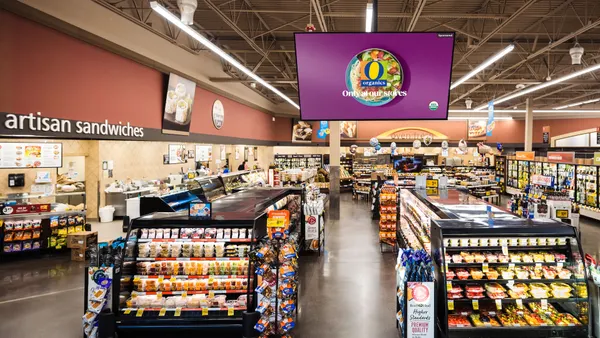Dive Brief:
- Meta Platforms' revenue derived from advertising grew 20% year-on-year in the fourth quarter to hit $36.2 billion, per an earnings release. Profits missed analyst expectations, and the Facebook owner's stock cratered on a weak forecast for the first quarter of 2022.
- User stats also disappointed. Facebook's daily active users (DAUs) averaged 1.93 billion in December, a 5% YoY gain. The DAUs for the big blue app were the same as in Q3, meaning the platform didn't grow in the close of 2021.
- At the same time, Meta continues to feel the impact of Apple privacy changes that have hampered advertising performance and thrown cold water on new formats. Looking forward, executives pinned their optimism on the strength of Reels, a TikTok clone, and a broader vision of building out the metaverse, an initiative that motivated a rebrand to Meta in October.
Dive Insight:
Meta's Q4 results — the first since it changed its name — saw the social networking giant reach an unwelcome watershed: Its core product didn't grow. In a category where emergent rivals are attracting flocks of new users, the big blue app has rarely looked so vulnerable. The blow of stagnant audience growth would be softened if Meta's ad business was booming in line with the meteoric gains it posted earlier in the pandemic, but that segment has also entered a slowdown period, with no apparent short-term solutions.
Facing these headwinds, Meta is prioritizing seven investment areas, CEO Mark Zuckerberg said on a call discussing the results with analysts. Those are: Reels, community messaging, e-commerce, ads, privacy, artificial intelligence and the metaverse. But that last item — the raison d'être for Facebook's ambitious rebrand last year — remains far-off from realization by Zuckerberg's own admission. It's also something that requires hefty upfront spending. Reality Labs, the Meta division that oversees the augmented and virtual reality hardware that power the metaverse, posted a $10.2 billion operating loss in 2021.
TikTok copycat Reels is a more tangible product. The short-form video portal is now Meta's fastest-growing content format "by far," according to Zuckerberg, as well as the largest contributor to engagement growth on Instagram. Meta has previously seen success in cribbing features from competitors, including Stories. Still, Reels is in its early days and currently monetizes at a lower rate than the core News Feed and Stories, executives said.
Beyond advertisers, winning over young consumers will be essential to sustain bets like Reels, and Meta has begun retooling its user experiences to make those demographics its North Star. But TikTok stands as a major obstacle. Weekly TikTok usage among Gen Zers grew to 63% of the group in November, a 13 percentage-point increase over the year-ago period, according to Forrester Research data shared in an email with Marketing Dive. Those numbers surpassed Instagram, which saw weekly usage among the same audience decline from 61% over the same period in 2020 to 57% in 2021.
"Meta is shifting to short-form video at a material deficit," said Mike Proulx, Forrester vice president and research director, in a statement. "Not only does Meta have to win back a declining share of its key (Gen Z) audience but it must also figure out how to better monetize Reels. Simply copying TikTok's features won’t cut it."
Other Meta experiments are starting to flag. A push to build out shopping capabilities did not pay off around the holidays, contrasting with competitors like Google, which reaped the benefits of e-commerce in a blowout quarter.
"E-commerce was an area where we saw a meaningful slowdown in growth in Q4," Meta Chief Financial Officer David Wehner said on the earnings call, adding that gaming was another area encountering roadblocks.
Explaining the gap in performance on commerce, Sandberg pointed to supply chain, labor and inflationary pressures that affected ad spending and shifted consumer habits. Apple was also called out as a culprit.
Zuckerberg and other executives have warned for months that Apple's changes to its iOS software, including making an important mobile identifier an opt-in feature, would hamper campaign performance. The early consequences of the iPhone maker's App Tracking Transparency framework started to manifest in Q3, and further came home to roost in the final stretch of 2021. Meta now has the formidable undertaking of reworking its targeting and measurement systems in a way other digital heavyweights might not have to.
"[We] believe Google's search ads business could have benefited relative to services like ours that face a different set of restrictions from Apple," Wehner said. "And given that Apple continues to take billions of dollars a year from Google Search ads, the incentive clearly exists for this policy discrepancy to continue."











